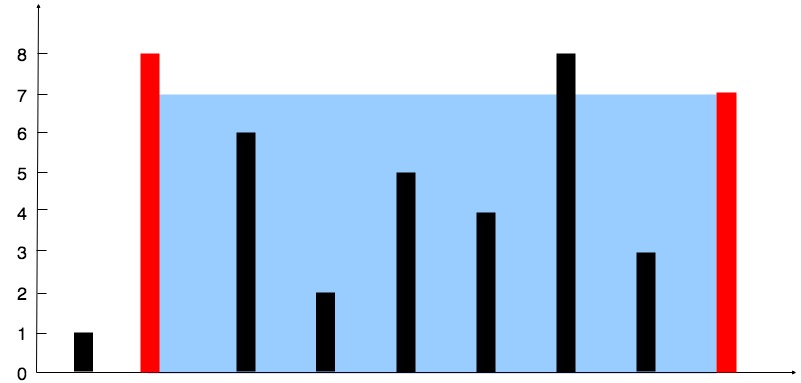
The above vertical lines are represented by array [1,8,6,2,5,4,8,3,7]. In this case, the max area of water (blue section) the container can contain is 49.
Example:
Input: [1,8,6,2,5,4,8,3,7] Output: 49
Approach 1 : Brute Force
In this case, we will simply consider the area for every possible pair of the lines and find out the maximum area out of those.
1 2 3 4 5 6 7 8 9 10 11 12 13 14 15 16 | class Solution: def maxArea(self, height): """ :type height: List[int] :rtype: int """ # 1. Brute Force max_water = 0 n = len(height) for i in range(n) : for j in range(i+1, n) : max_water = max((j-i)*min(height[i], height[j]), max_water) return max_water | cs |
Complexity Analysis
• Time complexity : \(O(n^2)\). Calculating area for all \(n(n-1)/2\) height pairs.
• Space complexity : \(O(1)\). Constant extra space is used.
Approach 2: Two Pointer Approach
Algorithm
The intuition behind this approach is that the area formed between the lines will always be limited by the height of the shorter line. Further, the father the lines, the more will be the area obtained.
We take two pointers, one at the beginning and one at the end of the array constituting the length of the lines. Further, we maintain a variable \(maxarea\) to store the maximum area obtained till now. At every step, we find out the area formed between them, update \(maxarea\) and move the pointer pointing to the shorter line towards the other and by one step.
1 2 3 4 5 6 7 8 9 10 11 12 13 14 15 16 17 18 19 20 21 22 23 24 | class Solution: def maxArea(self, height): """ :type height: List[int] :rtype: int """ left, right, y = 0, len(height)-1, 0 max_water = 0 while left < right : x = (j-i) if height[left]<=height[right] : y = height[left] left+=1 else : y = height[right] right -= 1 max_water = max(x * y, ans) return ans | cs |
Complexity Analysis
• Time complexity : \(O(n)\). Single pass.
• Space complexity : \(O(n)\). Constant space is used.
Source : https://leetcode.com/problems/container-with-most-water
'0 > algorithm' 카테고리의 다른 글
| Letter Combinations of a Phone Number (in Python) (0) | 2019.01.20 |
|---|---|
| 3Sum (in Python) (2) | 2019.01.20 |
| ZigZag Conversion (in Python) (0) | 2019.01.20 |
| Longest Palindromic Substring (in Python) (0) | 2019.01.19 |
| Median of Two Sorted Arrays (in Python) (0) | 2019.01.19 |
